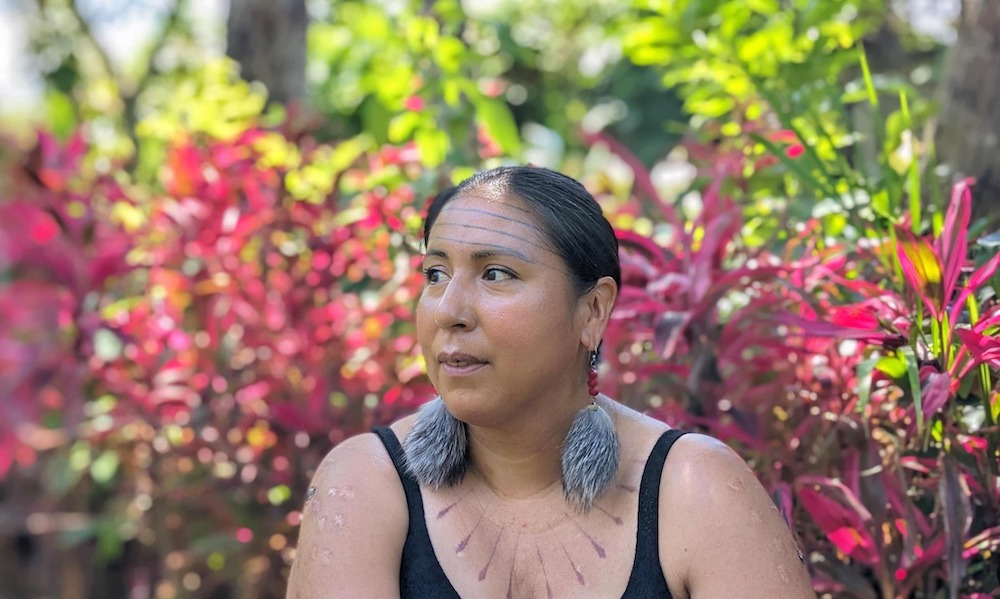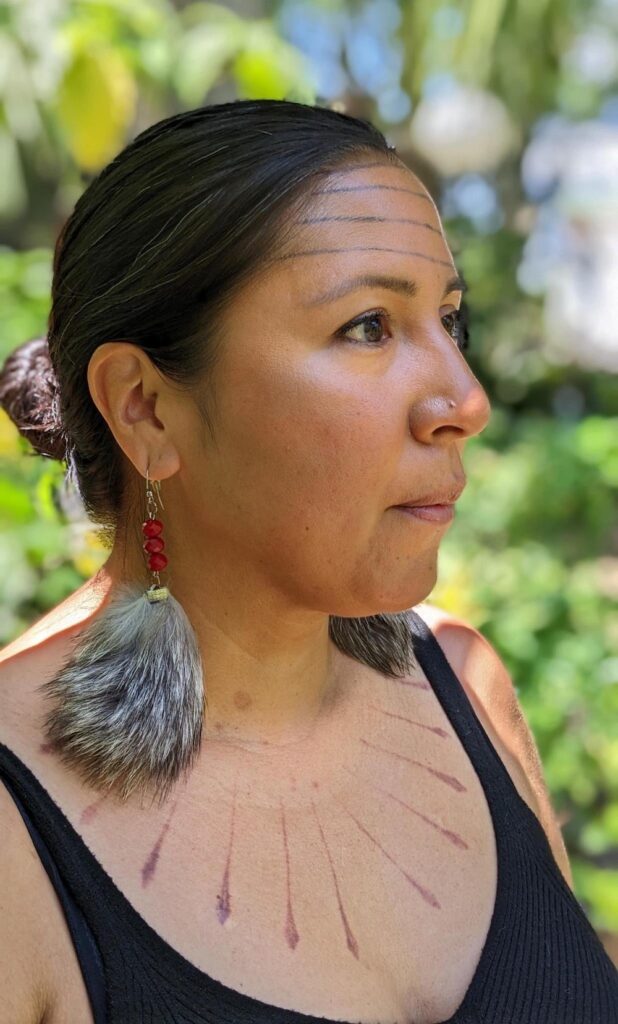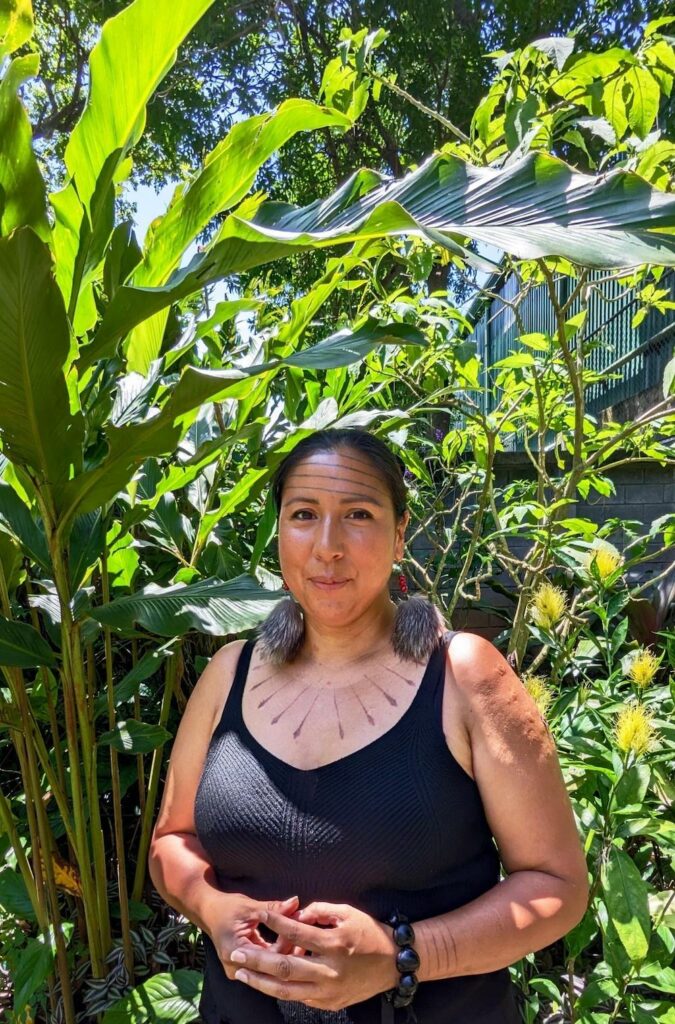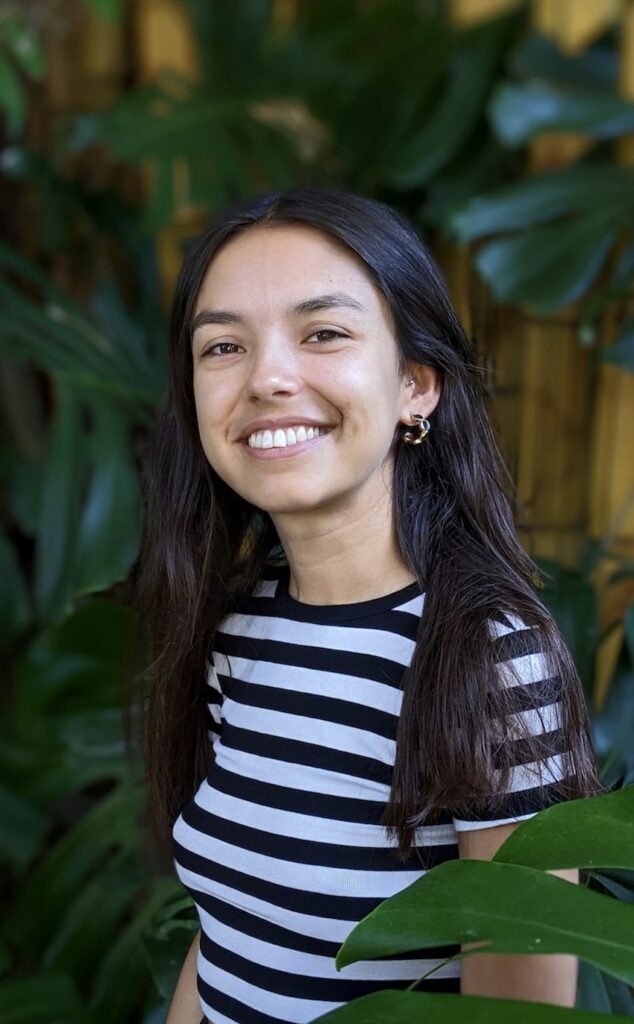1. Hosting a garden party
Strong branches do not grow overnight. Much attention goes into seeding the work and caring for the saplings so they can be rooted firmly in the earth. The work reflected in this magazine is thanks to the tireless commitment of many people, some of whose names are known and others not. In it, we are thinking of those who care for our forests and waters, those who question anthropocentric narratives telling us to disregard the non-human world, and those who see that technology is as old as time itself, neither purely digital nor inherently extractive. We thank everyone who nourishes these networks, responds and adapts to changing social and ecological landscapes, and seeks out new pathways for connection and action.
It is therefore fitting that many of the pieces in this special edition on the intersection of climate justice and digital rights were catalyzed together amid the branching walkways of a botanical garden in Heredia, Costa Rica.
The botanical garden represents many tensions at once.
Originally a space designed to categorize and control nature, the garden’s inherent connection to colonial legacies reinforces the university and empire as the seat of power for knowledge creation. Yet while the predominant narrative of these institutions is that humans can control nature, we know this is not the case. Upon closer view, the garden is a rich explosion of life, with diverse, interdependent ecological relations in constant motion. Amidst the bureaucratic illusion of control is a wild space of growth, change, and the radical repurposing of human-made infrastructures.


2. Issue at a glance
As a place of both resistance and rest, the walled garden provided our meeting with a space to breathe and think differently about the entrenched challenges we are facing as a planet, exacerbated by capitalist and extractive technologies. In this edition, you will find pieces born of those conversations, grouped into four sections. They represent different voices from the burgeoning community of researchers, practitioners, and funders whose work on technocapitalism, just transition, and sustainable and equitable infrastructures envisions tech in the service of equitable climate action. Special thanks to Maya Adams and Kira Simon-Kennedy for the beautiful visuals and photographs that accompany the pieces; and to La Bruja RISO for the cover design. We deliberately decided to make this a multilingual issue, including pieces in Spanish [ES], Portuguese [PT], and English [EN]. Please read the contributions with care and appreciation for all those who are exploring the deep and branching networks at this intersection.
Countering false and misleading solutions to ecological crisis
Becky Kazansky and Nikita Kekana reflect on and challenge the reduction of natural elements to financial commodities [EN]. In the interview about her book ‘Tecnologías para un planeta en llamas’ [ES] Paz Peña names and critiques technocapitalism and offers equitable feminist technological approaches as a way forward. We end this section with Jessica Botelho, Lori Regattieri, and Eliana Quiroz on empowering community-driven alliances against social-environmental and climate disinformation [EN].
Towards a just and equitable transition
Heather Milton-Lightening speaks to the tensions and contestation between colonialism, capitalism, and justice, and discusses ways of organizing through which we can create the world that we want to see [EN]. A conversation between Joana Varon and Alana Manchineri [EN|PT] brings to light Indigenous struggle in the Amazon, the physical and technical colonial relations enforced on them, and ways of organizing. The Kuirme Collective, consisting of Rub(én) Solís Mecalco, Aymara Llanque, and Camila Nobrega invert the dominant discourse on extraction and identify ways to build alliances across movements and issues [EN]. Michael Brennan and Hanan Elmasu end with a reflection on navigating the interstices as funders [EN].
‘The term “raw materials” itself should be questioned, as it contributes to the neo-extractivism narrative by preparing the ground for the appropriation and transformation of relations, territories and memories into “natural resources” or “materials”.’
Kuirme Collective
Imagining sustainable and equitable infrastructures
Paola Mosso and Janna Frenzel [EN] reflect on their workshop discussion envisioning digital infrastructures and share time capsules from the future. They emphasize that digital infrastructures are not just machines or processes, but the people who design, maintain and inhabit them. Juliana Guerra [ES] narrows in on who governs our internet infrastructures, who gets to decide how sustainability is defined, and who benefits from it. Jennifer Kamau [EN] shows us that as long as migrants from climate-vulnerable countries are trapped in racialized infrastructures and do not have an equal seat at the table, there can be neither equity nor sustainability. Remy Hellstern and Jen Liu argue that we need to learn from nature and create proactive response frameworks and technologies that are regenerative by design [EN].
‘Border walls will not stop the climate crisis; they just reinforce the injustice of carbon capitalism.’
Jennifer Kamau
Building bridges and ensuring tech serves equitable climate action
The video message ‘An open movement to support climate action’ [EN] by Michelle Cheripka for the Open Environmental Data Project reinforces that open is a tool to shift power, and that the open community is working to be in service of climate justice and equitable climate action. Luis Carrasco argues for the power of open data, but only if we can unlock its knowledge to the public [ES]. Maya Richman and Fieke Jansen reflect on their work to bring the climate justice and digital rights communities together [EN] and Nathaly Espitia Díaz offers an example of community organizing that centers self-care and collective care through ‘Postales sonoras’ or ‘Sound postcards’ [ES]. Oona Castro investigates the need for just socio-environmental infrastructures in the Amazonian Region [PT]. We close this special edition with an interview with Molly Mathews on organizing behind the scenes [EN].
While these thoughts began much earlier than June 2023, the conversations we had among the butterflies, beetles and birds sustained us and have given birth to new connections, alliances and dreams. We invite you to engage and grow more branches with us.

3. Crossing pathways
The interconnections between the co-editors are many, and long before the meeting in Heredia, Costa Rica, we met to discuss how to best share its conversations on climate justice and digital rights beyond our usual circles and networks. The idea for a special edition of Branch was born. The pieces contained here reflect a growing community of organizers, researchers, technologists and funders who want to interrupt extractive systems and build infrastructures that are just and sustainable for people and the planet.
Green Screen Coalition
The Green Screen Climate Justice and Digital Rights Coalition is a group of funders and practitioners looking to build bridges across the digital rights and climate justice movements. The coalition fundraised and co-designed the Costa Rica event, as well as this special edition of Branch, to help share essential perspectives on the intersection. The aim of the coalition is to be a catalyst in making visible the climate implications of technology by supporting emerging on-the-ground work, building networks, and embedding the issue as an area within philanthropy. Beginning in earnest in spring 2021, the coalition consists of Ariadne, Ford Foundation, Internet Society Foundation, Mozilla Foundation, Green Web Foundation, critical infrastructure lab, and Stiftung Mercator.
4. Green Screen Digital Rights and Climate Justice Edition
Over the last three years, Branch magazine has been sharing essential reflections and dreams of a sustainable and just internet for all. This special issue aims to showcase the work of a growing network with a plurality of approaches and perspectives at the intersection of climate justice and digital technology beyond the internet. It amplifies voices that approach the topics from feminist, decolonial and Indigenous perspectives, and which center care, respect, and non-extractive forms of exchange. With shorter pieces than previous event reports, we want to highlight a variety of perspectives. In this way, Branch magazine can cast a wider canopy and bring new allies and collaborators into the conversation. Our ultimate goal is to help document the multitude of approaches that currently challenge the status quo, and build transterritorial networks of solidarity and co-liberation. There were many hearts and hands who helped make this edition possible, you can find their names on the about page.
Katrin Fritsch researches, writes and consults at the intersection of climate justice, digital rights, and feminism. She advises organisations on data, justice, and emerging technologies. Currently, she is a senior program manager at Green Web Foundation, and the chair of epicenter.works. Previously, she co-founded and co-led MOTIF, a think tank working towards social justice in the digital age. Katrin is the co-initiator of Feminist Futures, and holds an MSc in Data & Society from London School of Economics and Political Science.
Katherine Waters is an editor and writer from London.
Maya Richman, co-lead of the Green Screen Coalition, is a jack-of-all trades who has spent the last ten years listening and learning about the plurality of struggles for technological justice across the world, and supporting activists and organizations to untangle technologies’ hold on our lives and reclaim its power to bring about social and political transformation.
Fieke Jansen is a co-principle investigator of the critical infrastructure lab and a postdoc researcher at the University of Amsterdam. Her research interests are to understand power and conflict around the environmental impact of expanding infrastructures. She is also the co-lead of the Green Screen Climate Justice and Digital Rights coalition. In her PhD at the Data Justice Lab at Cardiff University she looked at the institutional and societal implications of data-driven risk scoring and biometric recognition in Europe. Fieke is a former Mozilla and Green Web Foundation fellow where she explored ways to frame the climate crisis as a core digital rights issue. Prior to starting her PhD Fieke worked for Hivos, where she set up the Digital Defenders Partnership, and at Tactical Tech, where she led the politics of data program.







